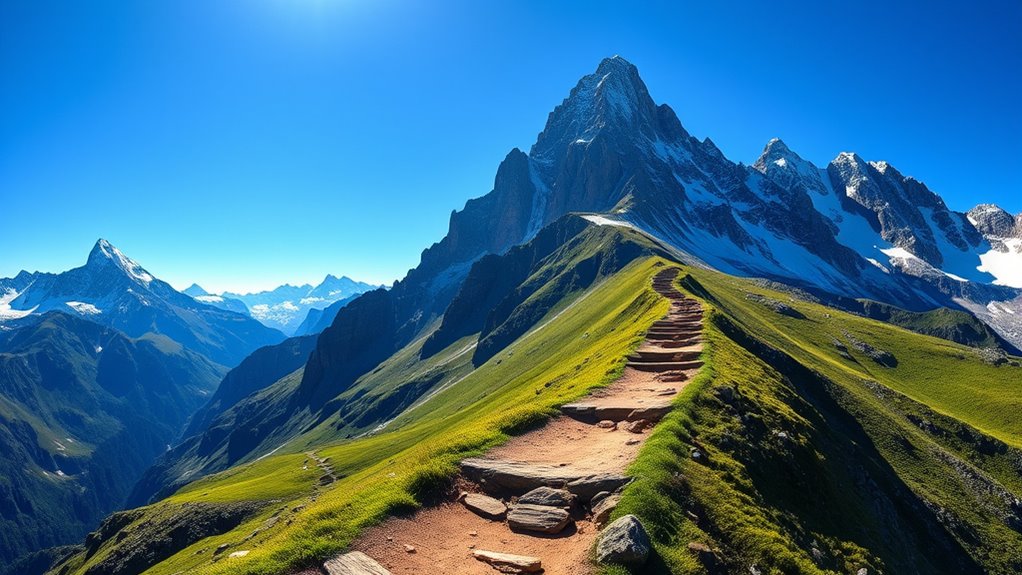Dreaming of mountains in a business context symbolizes both obstacles and achievements. Tall peaks may reflect challenges you’re facing or goals you’re aiming to attain, indicating your internal drive and resilience. The way you experience climbing or reaching the summit reveals your confidence or doubts about progress. If you want to understand what your specific mountain dream might mean for your work or ambitions, keep exploring how these symbols relate to your personal journey.
Key Takeaways
- Mountains in dreams can symbolize both obstacles to overcome and achievements to attain, depending on emotional context.
- Climbing mountains indicates active pursuit of goals, reflecting persistence and resilience in business pursuits.
- Reaching the mountain peak suggests success and milestones achieved in professional or personal endeavors.
- Overwhelming or insurmountable peaks may symbolize doubts, challenges, or obstacles hindering progress.
- The emotional tone and dream details help interpret whether mountains represent barriers or accomplishments.

Dream Symbols of Mountains
Dream Symbols of Mountains
Dream Symbols of Mountains
Dreaming of mountains often symbolizes challenges you’re facing or aspirations you hope to achieve. When you see tall peaks in your dreams, it’s a sign that your subconscious is processing significant obstacles or goals. This is where mountain symbolism in dreams becomes crucial. Interpreting tall peaks isn’t just about visual recognition; it’s about understanding what those heights represent in your waking life. Are these mountains standing in your way, or are they a symbol of reaching new heights? Your mind uses these towering structures to mirror your inner struggles and ambitions, making it essential to pay attention to the details of your dream.
Dreaming of mountains reflects your inner challenges or ambitions, urging you to interpret what heights mean in your life.
If you’re climbing a mountain, it often signifies that you’re actively working toward a goal, pushing yourself through difficulties to reach a summit. The mountain becomes a metaphor for the effort, persistence, and resilience needed to achieve something meaningful. Conversely, if the mountain appears insurmountable or you’re struggling to ascend, it might reflect feelings of frustration or doubt about your ability to overcome current challenges. Interpreting tall peaks in dreams involves considering your emotional response—are you exhilarated by the climb or overwhelmed by the height? This emotional tone can guide you in understanding whether your subconscious views obstacles as conquerable or as barriers that might require reassessment.
On the other hand, dreaming of a mountain summit can symbolize achievement, success, or the completion of a difficult journey. It’s a positive sign that you’re nearing a milestone or that your efforts are about to pay off. If you see yourself standing at the top, it indicates confidence and clarity about your goals. But if you’re looking up at the peak from below, it might suggest that your ambitions still seem distant or intimidating. In this case, the dream encourages you to evaluate your approach and perhaps break down big goals into smaller, more manageable steps.
Your interpretation of mountains in dreams depends heavily on context: the terrain, your feelings, and your actions. Whether the peaks symbolize obstacles or achievements, remember that they’re a reflection of your internal state. The more you analyze how you react to these mountain symbols, the clearer your path becomes—whether you need to overcome fears or celebrate progress. Ultimately, understanding the symbolism behind tall peaks can motivate you to keep climbing or help you recognize when it’s time to pause and reassess your route toward success. Additionally, the contrast ratio in visual representation can influence how vivid or realistic these mountain images appear, affecting your emotional response and interpretation. Recognizing the role of attention in your dream can help you better understand whether your subconscious sees these challenges as manageable or daunting. Cultivating mindful awareness during your waking hours can also enhance your understanding of these symbols and support your mental clarity in pursuing goals.
Frequently Asked Questions
How Do Cultural Differences Influence Mountain Symbolism in Dreams?
Cultural differences greatly influence mountain symbolism in your dreams, shaping the symbolic meanings you assign. In some cultures, mountains represent spiritual elevation and achievement, while others view them as obstacles or challenges. Your cultural interpretations dictate whether you see mountains as symbols of success or barriers. Understanding these varied symbolic meanings helps you better interpret your dreams, recognizing how your background influences the way you perceive and relate to mountain imagery.
Can Recurring Mountain Dreams Predict Career Success?
Recurring mountain dreams might hint at upcoming mountain challenges or career milestones. These dreams can serve as your subconscious alerts, encouraging you to prepare for obstacles or celebrate achievements. If you repeatedly see yourself climbing or reaching peaks, it suggests you’re on a path toward success. Pay attention to these dreams, as they can motivate you to overcome challenges and recognize opportunities that lead to career advancement.
Do Mountain Dreams Change With Life Circumstances?
Like shifting clouds over a mountain range, your dreams adapt with your life’s landscape. Mountain symbolism in your dreams reflects your evolving challenges and triumphs, changing as your circumstances do. Through dream interpretation, you notice peaks turning into obstacles or milestones, revealing your inner growth. These dreams serve as a mirror, showing how your perceptions of success and struggle transform, helping you navigate your journey with clearer insight and renewed strength.
Are Certain Mountain Types More Significant in Dreams?
Certain mountain types, like towering mountain peaks or serene mountain valleys, can carry different meanings in your dreams. Peaks often symbolize challenges or goals you’re aiming for, while valleys may represent periods of rest or reflection. Recognizing these differences helps you interpret your dreams more accurately, understanding whether you’re facing obstacles or celebrating achievements. Pay attention to the specific mountain features to gain deeper insights into your subconscious mind.
How Do Age and Gender Affect Mountain Dream Interpretations?
Oh, the timeless mystery—how age and gender influence mountain dreams! You might think, as you age, your perceptions shift from conquering peaks to admiring distant horizons. Gender-based symbolism plays a role too; women may see mountains as challenges, men as triumphs. Your age-related perceptions and gender shape your mountain dreams, turning them into reflections of your evolving self-image or societal expectations. So, dream on—your subconscious has a sense of humor.
Conclusion
Dreaming of mountains can symbolize both obstacles and achievements, reminding you that every peak is a challenge and every summit, a victory. While the climb may seem intimidating, it’s also a proof to your strength and perseverance. Embrace the journey, knowing that the highest peaks often come after the toughest climbs. In facing your mountains, you discover not just what’s in front of you, but what lies within—resilience born from overcoming, and triumph born from persistence.









